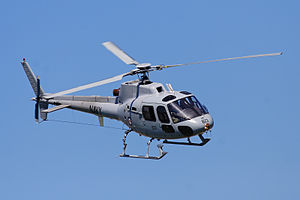Eurocopter AS350 Squirrel
| AS350 Écureuil/AStar | |
|---|---|
 |
|
| An AS350BA Squirrel of the Royal Australian Navy Fleet Air Arm at the 2008 Melbourne Grand Prix | |
| Role | Light utility helicopter |
| National origin | France |
| Manufacturer |
Aérospatiale Eurocopter Airbus Helicopters |
| First flight | 27 June 1974 |
| Introduction | 1975 |
| Status | In service |
| Primary users |
Brazilian Air Force Australian Defence Force Royal Jordanian Air Force |
| Produced | 1975–present |
| Number built | 3,590 (AS350/AS550: 2009) |
| Unit cost |
~US$2.0M, €1.5M (AS350 B2)
~US$2.3M, €1.75M (AS350 B3) |
| Variants | Eurocopter AS355 Écureuil 2 |
| Developed into |
Changhe Z-11 Eurocopter AS550 Fennec Eurocopter EC130 |
|
|
|
|
|
|
|
|
The Eurocopter (now Airbus Helicopters) AS350 Écureuil (Squirrel) is a single-engine light utility helicopter originally designed and manufactured in France by Aerospatiale and Eurocopter (now Airbus Helicopters). In North America, the AS350 is marketed as the AStar. The AS355 Ecureuil 2 is a twin-engine variant, marketed in North America as the TwinStar. The Eurocopter EC130 is a derivative of the AS350 airframe and is considered by the manufacturer to be part of the Écureuil single-engine family.
In the early 1970s, Aérospatiale decided to initiate a new development programme to produce a suitable replacement for the aging Aérospatiale Alouette II. While the Aérospatiale Gazelle, which had been developed in the 1960s and 1970s, had been met with numerous orders by military customers, commercial sales of the type had been less than anticipated, thus the need for a new civil-orientated development was identified.
The development of the new rotorcraft, which was headed by Chief Engineer René Mouille, was focused on the production of an economic and cost-effective aerial vehicle, thus both Aérospatiale's Production and Procurement departments were heavily involved in the design process. One such measure was the use of a rolled sheet structure, a manufacturing technique adapted from the automotive industry; another innovation was the newly developed Starflex main rotor. It was also decided that both civil and military variants of the emergent helicopter would be developed to conform with established military requirements.
On 27 June 1974, the first prototype, an AS350 C powered by a Lycoming LTS101 turboshaft engine, conducted its maiden flight at Marignane, France; the second prototype, powered by a Turbomeca Arriel 1A, following on 14 February 1975. The Arriel-powered version, the AS350B, intended for sale throughout the world except for North America, was certified in France on 27 October 1977, while the Lycoming powered AS350C (or AStar) was certified by the US Federal Aviation Administration on 21 December 1977. In March 1978, deliveries to customers began for the AS350B, deliveries of the AS350C began in April 1978.
...
Wikipedia
